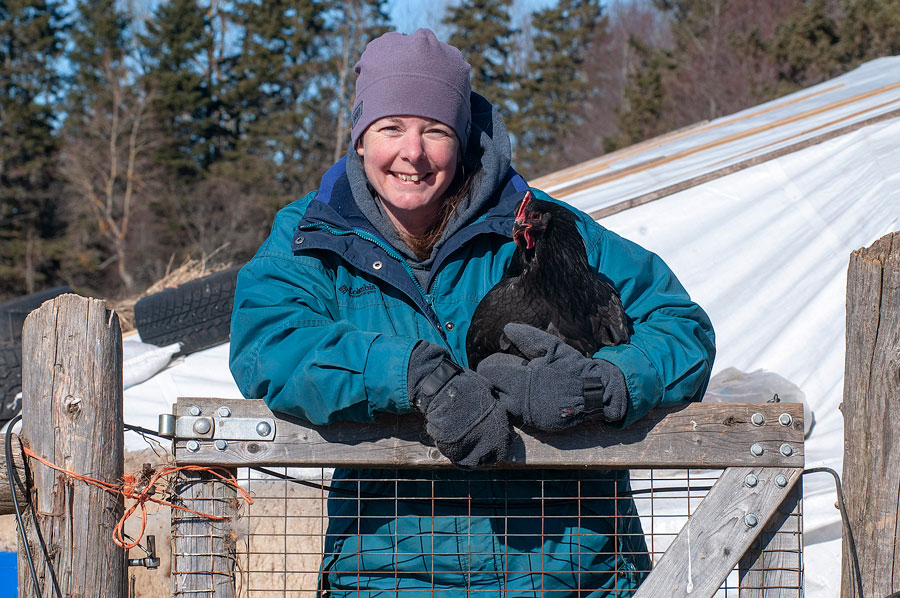In honour of International Women’s Day, a look at changing gender roles and the shift from farmer’s wife or farmer’s daughter to straight-up farmer, like Nancy Sanderson of Hope River Farm
Farming in Canada is evolving to have more female presence, according to the 2016 Census of Agriculture. Yet, through our history women have always played important roles in agriculture: roles such as sharing the workload of farm chores; maintaining harmony between the household and business; bookkeeping, or running the farm while their partner was out of town. They’ve just rarely been given the recognition—statistically-speaking, at least. With family farms most often listed under a husband’s name, contributions to farming made by female family members may not be aptly represented in statistical data, if at all.
What statistics do show is a growing trend of women taking ownership in farming as the primary farm operator or manager. From 1996 to 2016, the percentage of female farm operators rose from 25.3% to 28.7% (2016 Census of Agriculture). A recent study by Julia Laforge at the University of Manitoba revealed that in Atlantic Canada this trend may be even more pronounced, with an estimated 55% of new farmers being female. To get a picture of how the times are changing, or still need to change in our province, I chatted with some of my counterparts on the Island.
“The women of my childhood certainly played a supporting role but they were also very skilled at operating machinery or handling livestock,” Nancy Sanderson owner and operator of Hope River Farm, a pastured and grain-fed livestock operation, said. When it comes to female-led farms, in her view, “people are now as used to seeing a woman running a business as a man. Farming is just another business.”
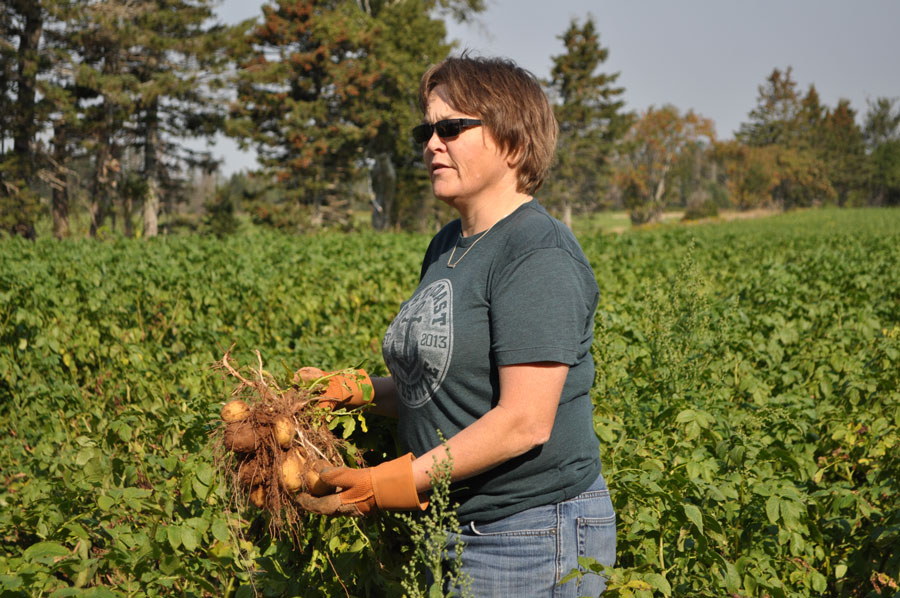
Lori Robinson explains potato growing Photo credit: Laura Weatherbie/Salty
In the 1980s she had no female role models, but when her brother showed little interest in taking over the 6th generation family farm, Lori Robinson jumped at the opportunity. Her parents never questioned her ability to do so because she was a girl. For the last 25 years, she’s been farm manager of Eric C Robinson Inc, a 2200-acre potato, soybean, forage, and barley operation in Albany. Robinson attributes the increase in female-led farms to social media, which she says, “has given women a springboard to tell their story.” If this didn’t exist, she thinks it would still be considered highly unusual to see women in decision-making roles in farming.
“Women farming as well as running their own business is growing more and more while parent roles are changing at the same time,” Flory Sanderson, founder and operator of Island Hill Farm Inc said. “Fathers didn’t carry babies or do the night time feedings. However, now fathers love to be part of it all. Just like women love to be bosses or self-employed.”
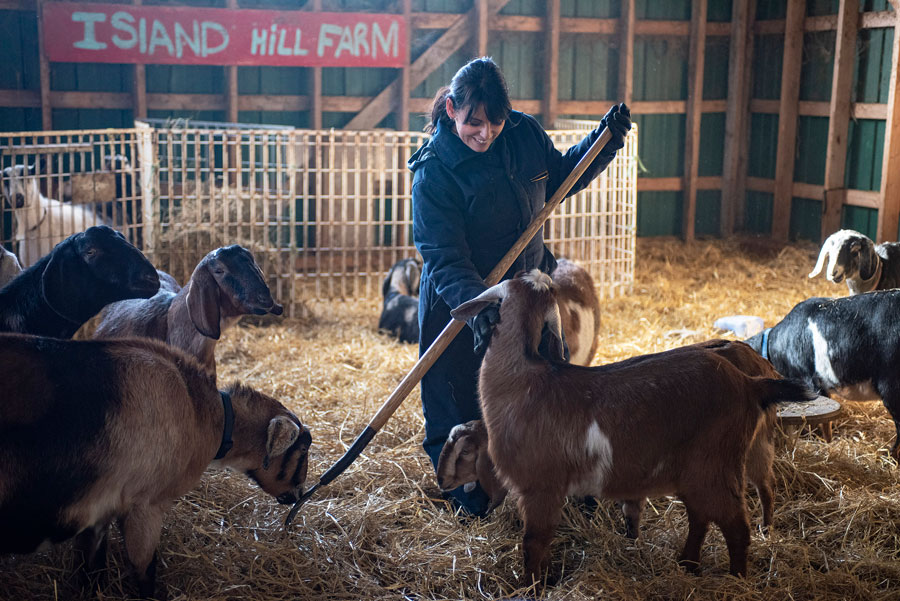
Flory Sanderson is in her element with her animals at Island Hill Farm Photo Credit: Brian McInnis
Like Robinson, she can’t recall female role models in farming but cites “being married to a farmer…encouragement from my daughters and my own personal drive to succeed,” as some of the main motivators to starting her own mixed animal farm in Hampshire.
Sally Bernard, co-owner, livestock manager, and marketing manager of Barnyard Organics in Freetown, said her mother served as her female role model, “My mom was the sheep farmer…my parents were able to include me in all farming activities and encouraged me to do anything I wanted to get involved in.” However, Bernard agrees the stereotype that farmers are male is still alive and strong. “There is a stereotype that if you’re not the primary operator, you’re ‘just the wife’. If the woman is the primary operator, I feel sure that her husband doesn’t refer to himself as the ‘farmer’s husband’. ”
In a 1985 issue of Common Ground: A Journal for Island Women, published by the PEI Women’s Network Project Committee, an article entitled ‘Women in Rural Life’ recounts the discrimination women faced from agriculture sales representatives, advertising industries, and media in failing to acknowledge their ownership of, or contribution to, farming. Today—over thirty years later—women farmers I contacted shared similar stories.
Robinson said she’s had countless experiences of sales reps instinctively turning to her male staff for answers despite her role as farm manager, because on most farms decisions are made by men. It’s also not unusual for her to get an eyebrow raise if she walks into a tractor dealership with the intention of buying one.
Jessica Mutch and Amanda Creamer of Mutch Better Produce, a 2-acre mixed vegetable farm in Cherry Valley, remarked on their experience running a booth at the Charlottetown Farmers’ Market, “We had countless people each market day ask us where we got our produce from. When we told people we grew it all ourselves we were met with reactions ranging anywhere from pleasantly surprised, shocked, and supportive to skepticism and disbelief.” Whereas, at neighbouring booths having a male presence, “the source of the produce was never questioned.” In responding to these situations they said, “Generally…a willingness to answer people’s questions honestly worked to convince people of the legitimacy of our skills as producers.”
Bernard said in all the agricultural-related publications they receive, “you are hard-pressed to find a picture of a woman in any of them, by herself.” She also noted her personal frustrations when a sales rep calls or comes to the farm and immediately asks if her husband is in. “That happens nearly every time. In 2019!”
While there may be a rise in female-led farms, when it comes to industry leadership on boards and in senior executive positions in agriculture it seems women are still underrepresented, accounting for an estimated 15% of these roles in some cases. In 2005, Robinson became the first ever female on the crop insurance board in PEI. Likewise, Bernard says she’s only seen gender parity on boards she’s sat on for the organic farming industry in the Atlantic region, “and it felt significant at the time, so we’ve still got work to do in conventional circles as well.”
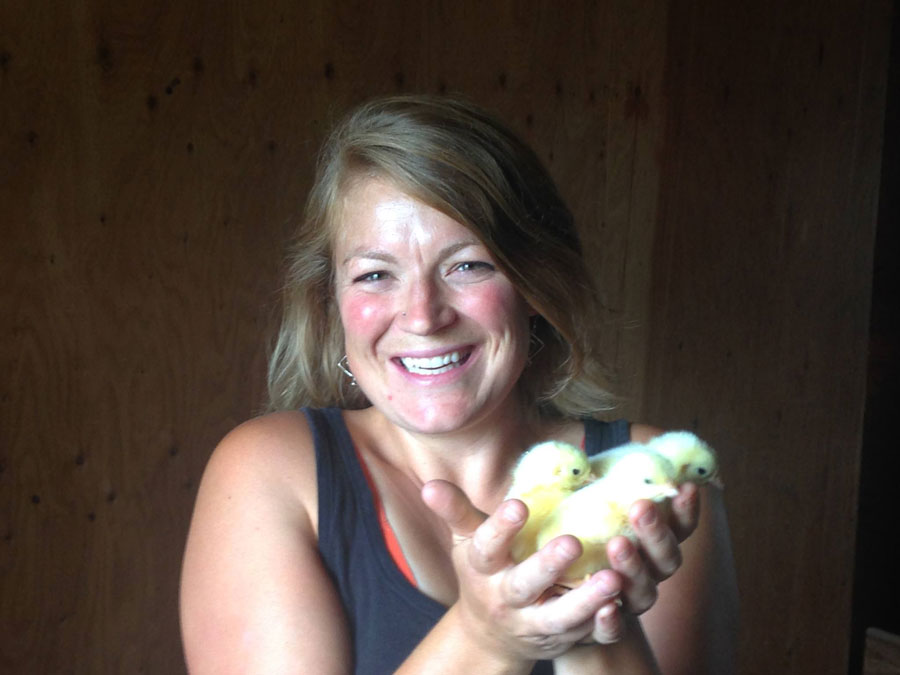
Sally Bernard co-owns and manages Barnyard Organics submitted photo
When asked about barriers to women taking more of these senior roles, most said perception was key. For Robinson, she sees the perception of not being welcome or not wanting to be seen as the only women in the room as potential obstacles for some women. Creamer and Mutch expressed a similar sentiment: “The greatest barrier to be overcome is an unwillingness to deviate from social norms…if you are willing to face the shock/skepticism/naysayers etc, then the possibilities are limitless.” For Flory Sanderson, who presently sits on many boards, she sees no barriers other than those women impose on themselves, “we can achieve any of these positions, sometimes we just have to work harder.”
With a gender shift in farming on the rise, it begs the question: How might a more prominent female presence in farm management and decision-making influence farming practices on the whole? Especially when you consider that the 2016 Census found a higher percentage of female farmers acquire a formal education compared to male farmers. Of the female farmers I spoke with, most had university backgrounds in agriculture.
Nancy Sanderson said she worked with a farmer that only hired female help because he considered women, “to be more gentle and patient with everything from equipment to livestock.” She also noted, “Dairy farms have reported higher milk production in barns with female milking staff. The feedlots I worked on had fewer accidents and better health outcomes from animals cared for by women.”
Bernard echoed these findings, “I’ve heard many times that women make better relief milkers for dairy farms.” She also said from her personal experience, “I have much more empathy for the livestock here…I’m particularly anxious of pregnant critters…I generally take note of small details regarding general health and happiness of livestock, while my partner would notice a problem with a machine that I wouldn’t.”
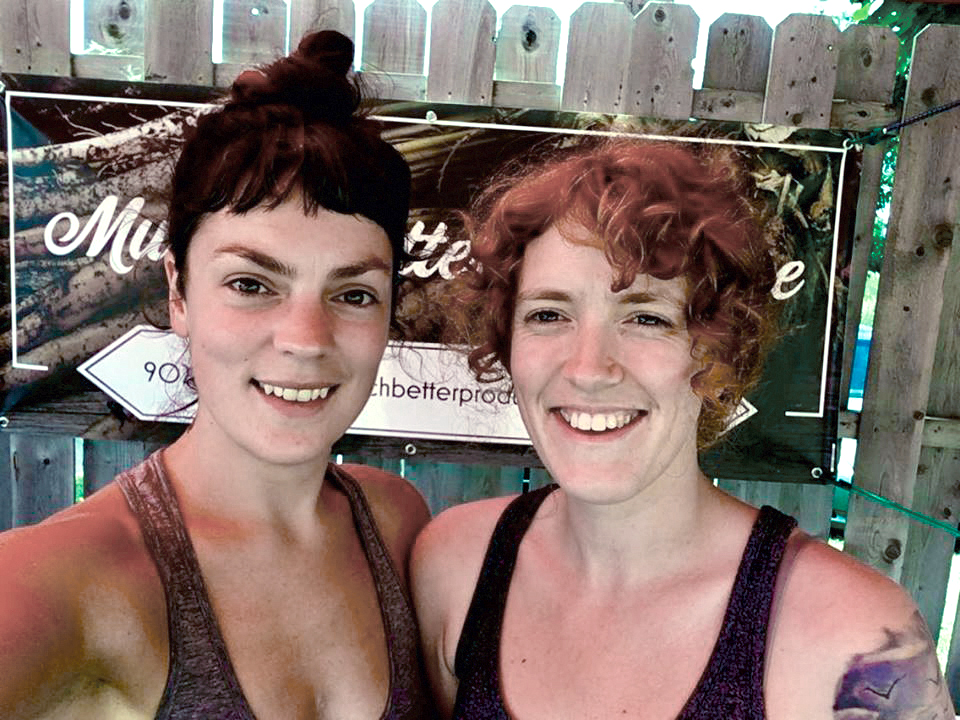
Jessica Mutch and Amanda Creamer, Mutch Better Produce submitted photo
It’s interesting to consider the progress in female-led farms compared to that of overcoming the 1950s housewife image, and the intimate relationship between growing your own food and preparing and preserving it in the kitchen. Bernard’s take was astute, “There’s a recognition [now] that feminism can be waged both out of the home and also on the farm, in the kitchen, and in caring for the soil.”
As a small farmer myself, it didn’t really cross my mind that I was a woman when I decided to farm. Flory Sanderson clarified this for me, “the new generation of farmers are not always influenced by gender. If they can and love to farm, then go for it!” And to the new generation, Nancy Sanderson paints a great vision, “I look forward to when we stop referring to ‘women farmers’ and just celebrate ‘great farmers’. I want to be a great farmer.”
- THERE’S NO TASTE LIKE HOME - November 1, 2019
- TIPS FOR GROWING CANNABIS - April 1, 2019
- FEMALE-LED FARMS ON THE RISE - March 1, 2019
- EATING WITH ALL YOUR SENSES - February 1, 2019
- LOVE COFFEE AND PEI? THIS BREW’S FOR YOU - January 1, 2019
- RISE OF A NEW SETTING DAY - May 1, 2018
- THE LOST LINK IN AGRICULTURE - March 31, 2018
- BEYOND TOURISM - March 1, 2018

